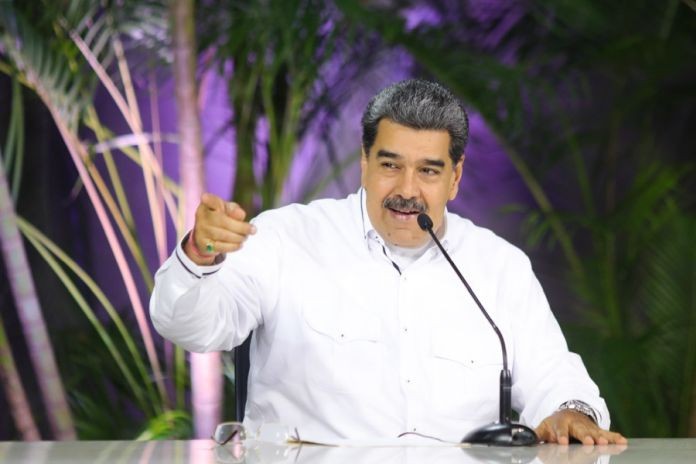By José Luis Granados Ceja
MEXICO CITY, Mexico, (venezuelanalysis.com) – Venezuelan president Nicolás Maduro confirmed that the country will hold constitutionally mandated presidential elections in 2024, rejecting calls for an early vote from Brussels, Washington, and the opposition.
“I don’t care what imperialism, the Right, or Europe thinks of the Venezuelan democratic process,” declared Maduro in a radio interview Saturday.
The Venezuelan president’s shift in tone marks a departure from his government’s previous stance, which had been seeking a more cooperative relationship with institutions such as the European Union on electoral matters.
“Our expectation is the same as always. We do not care what imperialism or the oligarchies think about the political, social, institutional, cultural, and economic life of Venezuela. It does not matter to us whether they make a statement or not, whether they acknowledge the result or not,” added the Venezuelan leader. Washington and US-backed opposition forces have consistently voiced unfounded “fraud” claims in order to not recognize electoral results.
Presidential elections must be held in 2024 according to the Venezuelan Constitution, with the winner taking the oath of office on January 10, 2025. In February, a number of Venezuelan opposition parties laid out a road map to hold a primary contest in October to choose their presidential candidate.
Venezuela’s most recent electoral contest, which saw the ruling Socialist Party of Venezuela secure a resounding victory, counted on a 136-member European Union’s (EU) observation mission. The mission marked the first time that the EU sent observers to the country since 2005.
The EU report concluded that “the Venezuelan electoral legal framework complies with most basic international electoral standards” but nonetheless claimed that “structural deficiencies” remained. The Brussels delegation did little to stem Washington’s condemnation of the 2021 vote nor to stem a barrage of negative press coverage of the result that labeled the process as “flawed”.
Despite a thawing of relations between Venezuela and some EU member-states such as France and Spain, the EU report also did not bring about sanctions relief, Venezuela’s principal demand.
Venezuela has been under a wide-reaching sanctions regime first imposed by former US president Donald Trump and largely kept in place by his successor Joe Biden. Following financial sanctions against PDVSA in August 2017, the US Treasury Department imposed an oil embargo in January 2019, effectively blocking the country’s main source of income. US allies in Brussels and Ottawa have largely followed the US’ lead, imposing their own sanctions on Venezuela.
Despite calls from figures such as the United Nations (UN) High Commissioner for Human Rights Volker Türk to lift sanctions, Washington and its allies have steadfastly refused.
During an event Thursday to commemorate “Bolivarian Anti-imperialist Day” in Caracas, National Assembly President Jorge Rodríguez said sanctions on the oil industry had cost the country over US$232 billion from 2015 to 2022 and impacted the country’s gross domestic product to the tune of US $630 billion.
“Today it is clear to them that with their sanctions they made us stronger, more dignified, more loving of our sovereignty, our independence and our truth,” said Rodríguez from Plaza Bolívar in the country’s capital.
Rodríguez, who additionally heads the government delegation in Mexico-based talks with the hardline opposition, added that no deal would be signed until all sanctions against Venezuela were lifted.
In November 2022, delegations representing both the government and opposition travelled to Mexico City to sign a partial agreement, mediated by Norway, focused on social issues following the resumption of the dialogue process after a year-long hiatus. The deal established a US $3 billion fund to be administered by the United Nations (UN) to address the Venezuelan people’s urgent and various social needs.
However the money has yet to be released, with opposition figures blaming bureaucratic delays, leading Rodríguez to warn that talks could be called off. The National Assembly president and ranking Chavista official appears to have now upped the ante.
“I affirm it responsibly, Venezuela is not going to sign any agreement with that sector of the Venezuelan opposition until the country is one hundred percent free of sanctions, until the 765 unilateral coercive measures signed by Donald Trump and Barack Obama are lifted,” said Rodríguez.
The statements by Maduro and Rodríguez mark a hardening of the government’s position. Efforts by Washington and Brussels to economically, politically, and diplomatically isolate the Maduro government have largely failed, with Venezuela re-establishing relations with a number of foreign states following geopolitical shifts throughout the continent and beyond.
Officials in Caracas likely feel bolstered after the Chinese-brokered deal between Saudi Arabia and Iran, which served as proof of declining Western hegemony in the world. Venezuela has likewise maintained closer relations with Iran, signing a deal in February to rehabilitate the South American nation’s largest refining complex. A high-ranking Iranian delegation again visited Venezuela on Friday.





